Unit 9 Have you ever been to a museum? Revision课件(共32张PPT)
文档属性
| 名称 | Unit 9 Have you ever been to a museum? Revision课件(共32张PPT) |
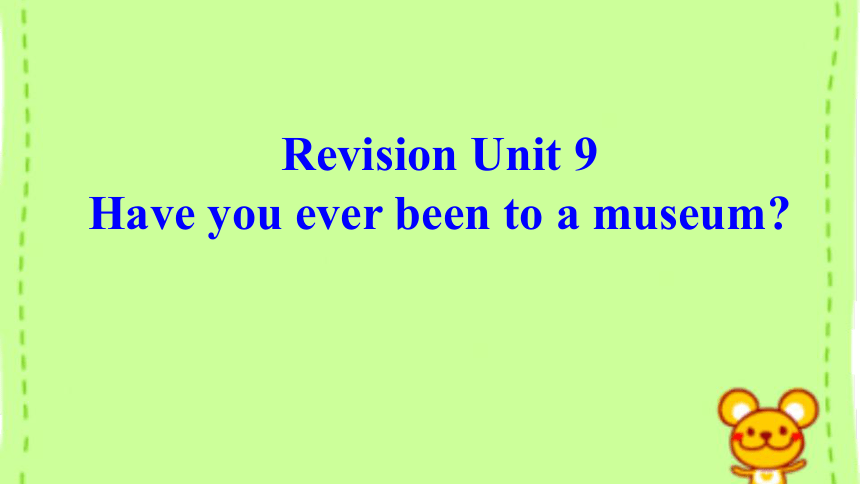
|
|
| 格式 | zip | ||
| 文件大小 | 509.7KB | ||
| 资源类型 | 教案 | ||
| 版本资源 | 人教新目标(Go for it)版 | ||
| 科目 | 英语 | ||
| 更新时间 | 2020-07-01 00:00:00 | ||
图片预览

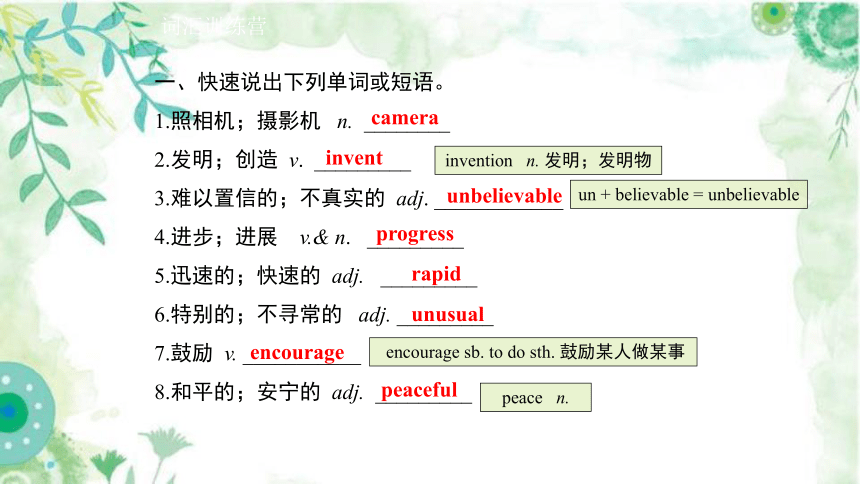
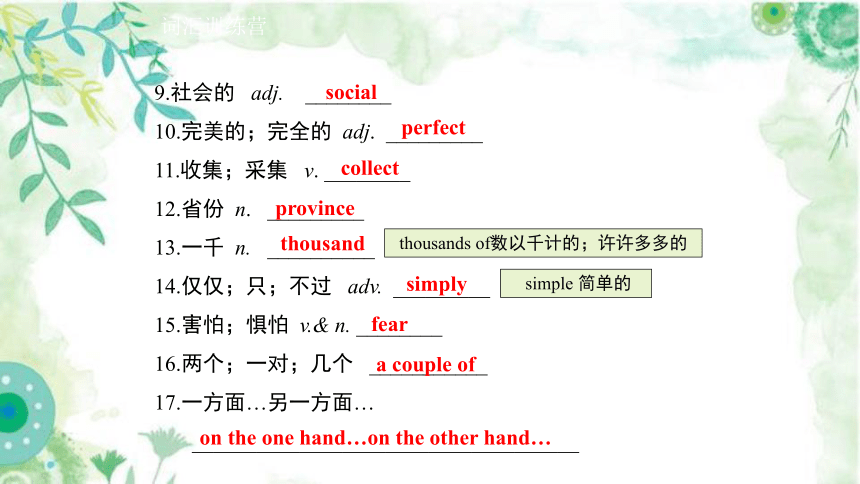
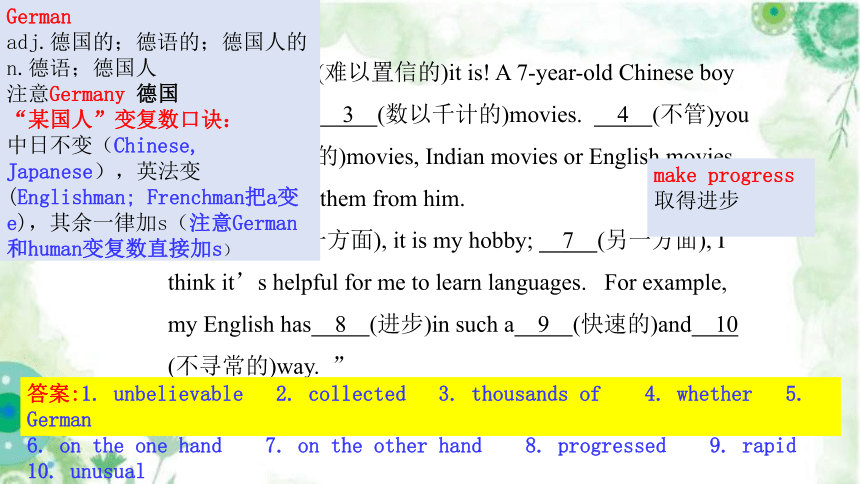
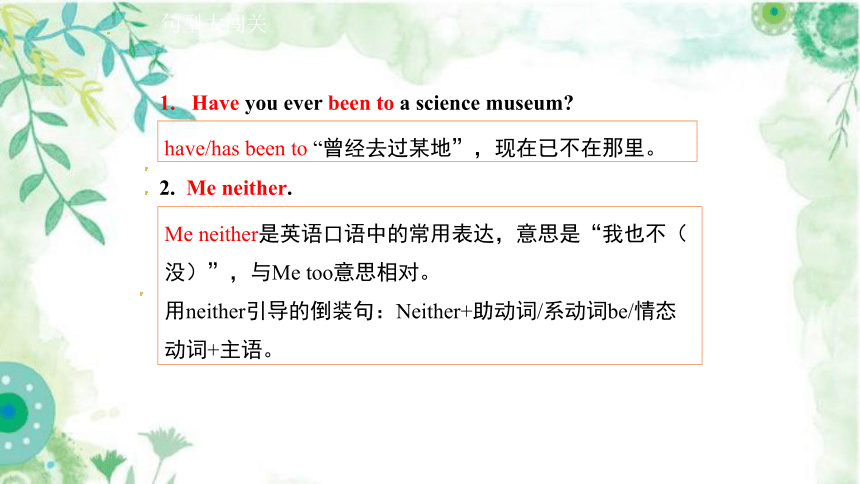
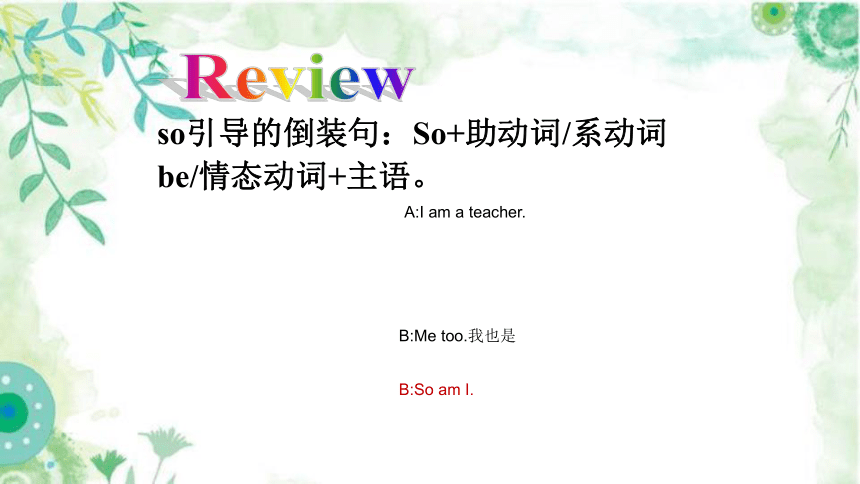

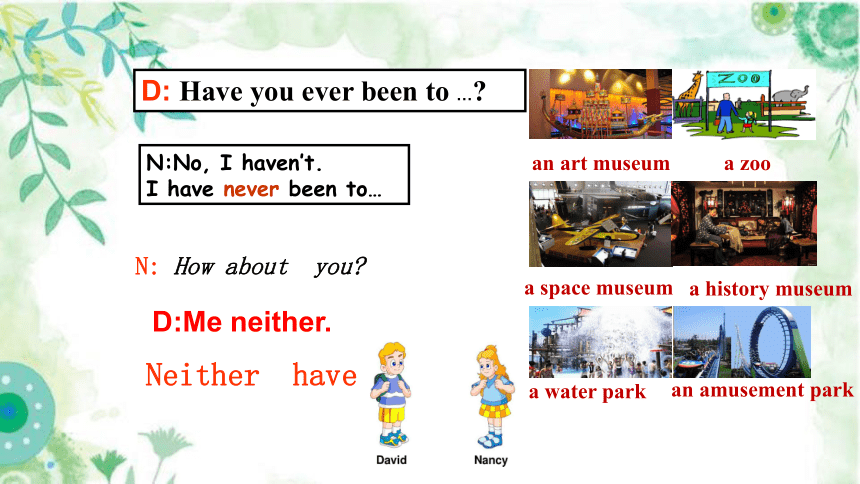
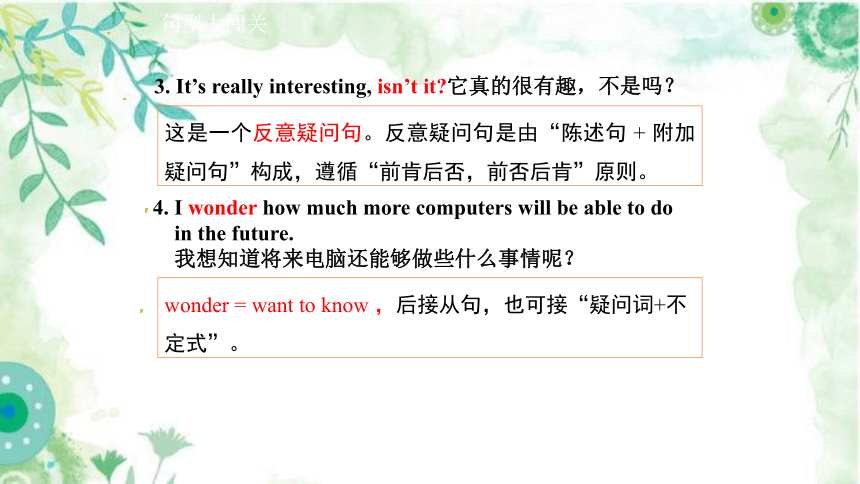
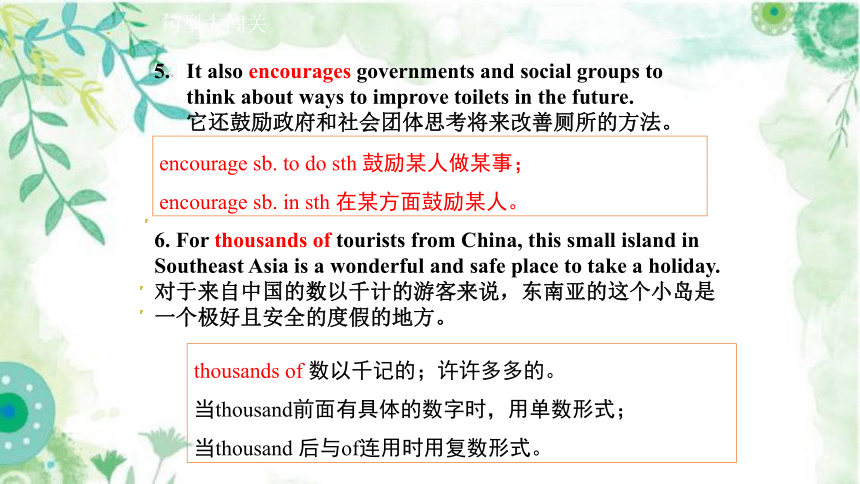

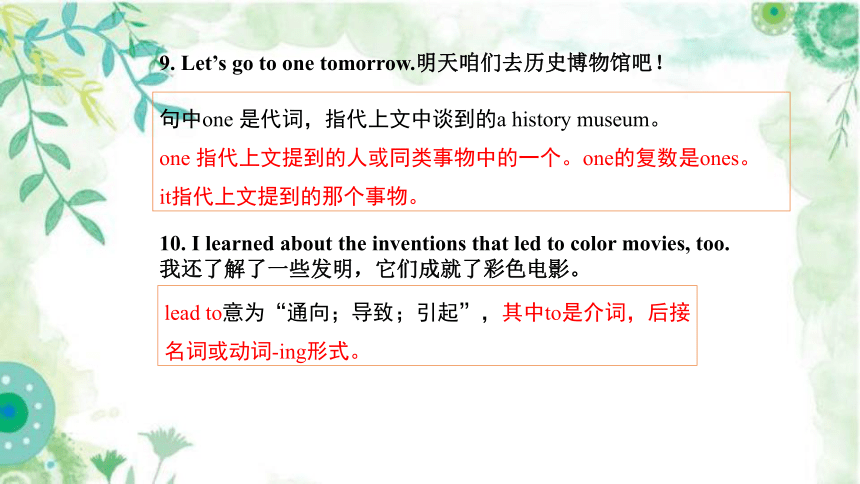
文档简介
(共32张PPT)
Revision
Unit
9
Have
you
ever
been
to
a
museum?
一、快速说出下列单词或短语。
1.照相机;摄影机
n.
________
2.发明;创造
v.
_________
3.难以置信的;不真实的
adj.
____________
4.进步;进展
?v.&
n.
_________
5.迅速的;快速的
adj.
_________
6.特别的;不寻常的
adj.
_________
7.鼓励
v.
___________
8.和平的;安宁的
adj.
_________
camera
invent
unbelievable?
progress
rapid
unusual
encourage
peaceful?
invention?
n.
发明;发明物
词汇训练营
encourage
sb.
to
do
sth.
鼓励某人做某事
peace?
n.
un
+
believable
=
unbelievable
9.社会的
adj.
________
10.完美的;完全的
adj.
_________
11.收集;采集
v.
________
12.省份
n.
_________
13.一千
n.
__________
14.仅仅;只;不过
adv.
_________
15.害怕;惧怕
v.&
n.
________
16.两个;一对;几个
___________
17.一方面…另一方面…
____________________________________
social
perfect
collect?
province
thousand
simply
fear
a
couple
of
thousands
of数以千计的;许许多多的
词汇训练营
simple
简单的
on
the
one
hand…on
the
other
hand…
词汇串记
How 1
(难以置信的)it
is!
A
7-year-old
Chinese
boy
has 2 (收集) 3 (数以千计的)movies.
4 (不管)you
like 5 (德国的)movies,
Indian
movies
or
English
movies,
you
can
borrow
them
from
him.
“ 6 (一方面),
it
is
my
hobby;
7 (另一方面),
I
think
it’s
helpful
for
me
to
learn
languages.
For
example,
my
English
has 8 (进步)in
such
a 9 (快速的)and 10 (不寻常的)way.
”
答案:1.
unbelievable
2.
collected
3.
thousands
of
4.
whether
5.
German
6.
on
the
one
hand
7.
on
the
other
hand
8.
progressed
9.
rapid
10.
unusual
German
adj.德国的;德语的;德国人的
n.德语;德国人
注意Germany
德国
“某国人”变复数口诀:
中日不变(Chinese,
Japanese),英法变(Englishman;
Frenchman把a变e),其余一律加s(注意German和human变复数直接加s)
make
progress取得进步
Have
you
ever
been
to
a
science
museum?
have/has
been
to
“曾经去过某地”,现在已不在那里。
2.
Me
neither.
Me
neither是英语口语中的常用表达,意思是“我也不(没)”,与Me
too意思相对。
用neither引导的倒装句:Neither+助动词/系动词be/情态动词+主语。
句型大闯关
so引导的倒装句:So+助动词/系动词be/情态动词+主语。
Review
B:Me
too.我也是
A:I
am
a
teacher.
B:So
am
I.
Me
neither.
neither引导的倒装句:Neither+助动词/系动词be/情态动词+主语
A:I
can’t
make
it.
Review
B:Me
neither
.
B:Neither
can
I.
D:Me
neither.
N:
How
about
you?
D:
Have
you
ever
been
to
…?
N:No,
I
haven’t.
I
have
never
been
to…
Neither
have
I.
an
art
museum
a
zoo
a
space
museum
a
history
museum
a
water
park
an
amusement
park
3.
It’s
really
interesting,
isn’t
it?它真的很有趣,不是吗?
这是一个反意疑问句。反意疑问句是由“陈述句
+
附加疑问句”构成,遵循“前肯后否,前否后肯”原则。
4.
I
wonder
how
much
more
computers
will
be
able
to
do
in
the
future.
我想知道将来电脑还能够做些什么事情呢?
wonder
=
want
to
know
,后接从句,也可接“疑问词+不定式”。
句型大闯关
5.
It
also
encourages
governments
and
social
groups
to
think
about
ways
to
improve
toilets
in
the
future.
它还鼓励政府和社会团体思考将来改善厕所的方法。
encourage
sb.
to
do
sth
鼓励某人做某事;
encourage
sb.
in
sth
在某方面鼓励某人。
6.
For
thousands
of
tourists
from
China,
this
small
island
in
Southeast
Asia
is
a
wonderful
and
safe
place
to
take
a
holiday.
对于来自中国的数以千计的游客来说,东南亚的这个小岛是
一个极好且安全的度假的地方。
thousands
of
数以千记的;许许多多的。
当thousand前面有具体的数字时,用单数形式;
当thousand
后与of连用时用复数形式。
句型大闯关
You
won’t
have
any
problem
getting
rice,
noodles
or
dumplings.你会毫不费力地找到米饭、面条和饺子。
have
problems
(in)
doing
sth.
“做某事遇到困难或麻烦”,也可用have
trouble/difficulty
(in)
doing
sth.
whether…or…“不管(无论)……还是……”,引导让步状语从句。若主句用一般将来时,则从句用一般现在时表将来。如:Whether
it
is
cloudy
or
rainy
tomorrow,
I’ll
go
camping.
不管明天是阴天还是下雨,我都要去野营。
8.
Whether
you
like
Indian
food,
Western
food
or
Japanese
food,
you’ll
all
find
it
in
Singapore!无论你是喜欢印度食物、西方食物还是日本食物,在新加坡你都会找到!
句型大闯关
句中one
是代词,指代上文中谈到的a
history
museum。
one
指代上文提到的人或同类事物中的一个。one的复数是ones。
it指代上文提到的那个事物。
lead
to意为“通向;导致;引起”,其中to是介词,后接名词或动词-ing形式。
9.
Let’s
go
to
one
tomorrow.明天咱们去历史博物馆吧!
I
learned
about
the
inventions
that
led
to
color
movies,
too.
我还了解了一些发明,它们成就了彩色电影。
11.
Have
you
tried
Chinese
food?你品尝过中国食物吗?
try
sth.
尝试某事物
try
one’s
best
to
do
sth.
尽某人最大努力做某事
try
try
to
do
sth.
尽力做某事
try
doing
sth.
尝试做某事
try
on
试穿
单项选择。
1.
—I
have
never
been
to
Tibet.
What
about
you,
Tina?
—Me______.
A.
too
B.
also
C.
either
D.
neither
2.
______
people
have
lost
their
lives
in
this
earthquake.
A.
Thousands
B.
Thousand
of
C.
Thousands
of
D.
Ten
thousands
句型大闯关
_____
you
like
swimming,
fishing
_____
boating,
you’ll
have
fun
in
the
water
park.
A.
Whether;
or
B.
If;
or
C.
Either;
or
D.
Both;
and
4.
Do
you
have
any
problem
_____
English?
A.
learn
B.
to
learn
C.
learning
D.
learned
5.
Her
story
encouraged
us
_____
our
best
to
help
the
poor.
A.
do
B.
done
C.
to
do
D.
doing
句型大闯关
I
don’t
think
they
can
make
everything
good
enough,
_____
?
A.
do
I
B.
can
they
C.
can’t
they
7.
—Is
Kate
serious?
—I
____.
She
never
means
it.
A.
suppose
B.
agree
C.
believe
D.
wonder
句型大闯关
8.
——I
didn’t
hear
you
come
in
just
now.
——That's
good.
I
tried________the
baby
up.
to
wake
B.
not
to
wake
C.
waking
9.
As
soon
as
she
_______at
home,
Sally
knew
she
had
bought
the
wrong
dress.
A.
handed
it
in
B.
tried
it
on
C.
cut
it
out
D
made
up
现在完成时(2)
语法加油站
1.
现在完成时态的标志词:
1)just
“刚刚”,already
“已经”,两者都用于肯定句中,一般置于have/has之后。否定句中则用yet,
表示“还(未)”。
We
have
already
finished
our
homework.
???我们已完成家庭作业了。
They
haven’t
finished
their
homework
yet.
???他们还没有完成家庭作业。???
2)
ever和never。多用于否定或疑问句中,表示“曾经”
或“从未”等。
—Have
you
ever
been
to
the
Great
Wall?
????
你曾经去过长城吗?
—No,
I
have
never
been
to
the
Great
Wall.
????
不,
我从未去过长城。
语法加油站
3)
用表示到说话为止的过去时间状语,
如just,
before,
up
to
now等。
I
have
seen
her
before,
but
I
can
not
remember
where.
我以前见过她,
但记不起在哪里见过。???
【合作总结】
1.
相同点:
has/have
been/gone
to后均可接地点
2.
不同点:
(1)have(has)been
to意为“去过某地”,
现在已不在那里了,
后可接次数,
如once,
twice,
three
times等,
表示“去过某地几次”,
也可和just,
never,
ever等连用。
(2)have(has)gone
to意为“到某地去了”,
表示到了某地还没回来或正在去某地的途中,
总之说话时该人不在现场。一般不用第一人称、第二人称代词作句子的主语。
2.
三大句式的用法区别:
语法加油站
用法
例句
have/has
been
to
强调“去过”某地,人已经回来,后面可接表示次数的状语。
I
have
been
to
Shanghai
twice.
我去过上海两次。
have/has
gone
to
强调“去了”某地,现在不在说话的现场。
My
father
has
gone
to
Shanghai
for
a
meeting.
他(已经)去了上海。
have/has
been
in
表示某人“已经在某地住了一段时间”,现在仍在那里。
The
old
man
has
been
in
the
city
for
many
years.
那个老人已经在这个城市很多年了。
单项选择。
1.
—
I’d
like
to
introduce
my
best
friend
to
you,
Peter.
—
Thank
you,
Lucy.
But
we
_____
already.
A.
meet
B.
met
C.
will
meet
D.
have
met
2.
—
The
Amazing
Spider
Man
2
is
on
these
days.
It’s
fantastic.
???
—Really?
But
I
_______
it
yet.
A.
didn’t
see????
B.
won’t
see????????
C.
haven’t
seen??????
D.
is
not
seeing
语法加油站
D
C
语法加油站
3.
—Where
is
Mr.
Wang?
—He
_____
the
park.
A.
has
gone
to
B.
have
gone
to
C.
has
been
to
D.
have
been
to
4.
—
Have
you
_______
visited
Shanghai?
—
No,
_______.
A.
ever;
not
B.
never;
not
C.
ever;
never
D.
never;
ever
A
C
语法加油站
5.
—
How
well
do
you
know
Sydney
Opera
House?
—
I
know
it
very
well.
I
_____
Sydney
many
times.
A.
have
been
in
B.
have
been
to
C.
have
gone
to
B
C
C
实战演练
A
B
A
B
D
D
C
B
Let's
go
somewhere
interesting
today
Two
thirds
of
boys
like
basketball
My
father
has
been
to
Beijing
twice
Our
class
progressed
a
lot
this
term
She
feared
to
tell
him
the
truth
Homework
for
today
Read
2b
on
Page
70
three
times.
Remember
the
phrases
and
grammar
we
have
reviewed
today.
Revision
Unit
9
Have
you
ever
been
to
a
museum?
一、快速说出下列单词或短语。
1.照相机;摄影机
n.
________
2.发明;创造
v.
_________
3.难以置信的;不真实的
adj.
____________
4.进步;进展
?v.&
n.
_________
5.迅速的;快速的
adj.
_________
6.特别的;不寻常的
adj.
_________
7.鼓励
v.
___________
8.和平的;安宁的
adj.
_________
camera
invent
unbelievable?
progress
rapid
unusual
encourage
peaceful?
invention?
n.
发明;发明物
词汇训练营
encourage
sb.
to
do
sth.
鼓励某人做某事
peace?
n.
un
+
believable
=
unbelievable
9.社会的
adj.
________
10.完美的;完全的
adj.
_________
11.收集;采集
v.
________
12.省份
n.
_________
13.一千
n.
__________
14.仅仅;只;不过
adv.
_________
15.害怕;惧怕
v.&
n.
________
16.两个;一对;几个
___________
17.一方面…另一方面…
____________________________________
social
perfect
collect?
province
thousand
simply
fear
a
couple
of
thousands
of数以千计的;许许多多的
词汇训练营
simple
简单的
on
the
one
hand…on
the
other
hand…
词汇串记
How 1
(难以置信的)it
is!
A
7-year-old
Chinese
boy
has 2 (收集) 3 (数以千计的)movies.
4 (不管)you
like 5 (德国的)movies,
Indian
movies
or
English
movies,
you
can
borrow
them
from
him.
“ 6 (一方面),
it
is
my
hobby;
7 (另一方面),
I
think
it’s
helpful
for
me
to
learn
languages.
For
example,
my
English
has 8 (进步)in
such
a 9 (快速的)and 10 (不寻常的)way.
”
答案:1.
unbelievable
2.
collected
3.
thousands
of
4.
whether
5.
German
6.
on
the
one
hand
7.
on
the
other
hand
8.
progressed
9.
rapid
10.
unusual
German
adj.德国的;德语的;德国人的
n.德语;德国人
注意Germany
德国
“某国人”变复数口诀:
中日不变(Chinese,
Japanese),英法变(Englishman;
Frenchman把a变e),其余一律加s(注意German和human变复数直接加s)
make
progress取得进步
Have
you
ever
been
to
a
science
museum?
have/has
been
to
“曾经去过某地”,现在已不在那里。
2.
Me
neither.
Me
neither是英语口语中的常用表达,意思是“我也不(没)”,与Me
too意思相对。
用neither引导的倒装句:Neither+助动词/系动词be/情态动词+主语。
句型大闯关
so引导的倒装句:So+助动词/系动词be/情态动词+主语。
Review
B:Me
too.我也是
A:I
am
a
teacher.
B:So
am
I.
Me
neither.
neither引导的倒装句:Neither+助动词/系动词be/情态动词+主语
A:I
can’t
make
it.
Review
B:Me
neither
.
B:Neither
can
I.
D:Me
neither.
N:
How
about
you?
D:
Have
you
ever
been
to
…?
N:No,
I
haven’t.
I
have
never
been
to…
Neither
have
I.
an
art
museum
a
zoo
a
space
museum
a
history
museum
a
water
park
an
amusement
park
3.
It’s
really
interesting,
isn’t
it?它真的很有趣,不是吗?
这是一个反意疑问句。反意疑问句是由“陈述句
+
附加疑问句”构成,遵循“前肯后否,前否后肯”原则。
4.
I
wonder
how
much
more
computers
will
be
able
to
do
in
the
future.
我想知道将来电脑还能够做些什么事情呢?
wonder
=
want
to
know
,后接从句,也可接“疑问词+不定式”。
句型大闯关
5.
It
also
encourages
governments
and
social
groups
to
think
about
ways
to
improve
toilets
in
the
future.
它还鼓励政府和社会团体思考将来改善厕所的方法。
encourage
sb.
to
do
sth
鼓励某人做某事;
encourage
sb.
in
sth
在某方面鼓励某人。
6.
For
thousands
of
tourists
from
China,
this
small
island
in
Southeast
Asia
is
a
wonderful
and
safe
place
to
take
a
holiday.
对于来自中国的数以千计的游客来说,东南亚的这个小岛是
一个极好且安全的度假的地方。
thousands
of
数以千记的;许许多多的。
当thousand前面有具体的数字时,用单数形式;
当thousand
后与of连用时用复数形式。
句型大闯关
You
won’t
have
any
problem
getting
rice,
noodles
or
dumplings.你会毫不费力地找到米饭、面条和饺子。
have
problems
(in)
doing
sth.
“做某事遇到困难或麻烦”,也可用have
trouble/difficulty
(in)
doing
sth.
whether…or…“不管(无论)……还是……”,引导让步状语从句。若主句用一般将来时,则从句用一般现在时表将来。如:Whether
it
is
cloudy
or
rainy
tomorrow,
I’ll
go
camping.
不管明天是阴天还是下雨,我都要去野营。
8.
Whether
you
like
Indian
food,
Western
food
or
Japanese
food,
you’ll
all
find
it
in
Singapore!无论你是喜欢印度食物、西方食物还是日本食物,在新加坡你都会找到!
句型大闯关
句中one
是代词,指代上文中谈到的a
history
museum。
one
指代上文提到的人或同类事物中的一个。one的复数是ones。
it指代上文提到的那个事物。
lead
to意为“通向;导致;引起”,其中to是介词,后接名词或动词-ing形式。
9.
Let’s
go
to
one
tomorrow.明天咱们去历史博物馆吧!
I
learned
about
the
inventions
that
led
to
color
movies,
too.
我还了解了一些发明,它们成就了彩色电影。
11.
Have
you
tried
Chinese
food?你品尝过中国食物吗?
try
sth.
尝试某事物
try
one’s
best
to
do
sth.
尽某人最大努力做某事
try
try
to
do
sth.
尽力做某事
try
doing
sth.
尝试做某事
try
on
试穿
单项选择。
1.
—I
have
never
been
to
Tibet.
What
about
you,
Tina?
—Me______.
A.
too
B.
also
C.
either
D.
neither
2.
______
people
have
lost
their
lives
in
this
earthquake.
A.
Thousands
B.
Thousand
of
C.
Thousands
of
D.
Ten
thousands
句型大闯关
_____
you
like
swimming,
fishing
_____
boating,
you’ll
have
fun
in
the
water
park.
A.
Whether;
or
B.
If;
or
C.
Either;
or
D.
Both;
and
4.
Do
you
have
any
problem
_____
English?
A.
learn
B.
to
learn
C.
learning
D.
learned
5.
Her
story
encouraged
us
_____
our
best
to
help
the
poor.
A.
do
B.
done
C.
to
do
D.
doing
句型大闯关
I
don’t
think
they
can
make
everything
good
enough,
_____
?
A.
do
I
B.
can
they
C.
can’t
they
7.
—Is
Kate
serious?
—I
____.
She
never
means
it.
A.
suppose
B.
agree
C.
believe
D.
wonder
句型大闯关
8.
——I
didn’t
hear
you
come
in
just
now.
——That's
good.
I
tried________the
baby
up.
to
wake
B.
not
to
wake
C.
waking
9.
As
soon
as
she
_______at
home,
Sally
knew
she
had
bought
the
wrong
dress.
A.
handed
it
in
B.
tried
it
on
C.
cut
it
out
D
made
up
现在完成时(2)
语法加油站
1.
现在完成时态的标志词:
1)just
“刚刚”,already
“已经”,两者都用于肯定句中,一般置于have/has之后。否定句中则用yet,
表示“还(未)”。
We
have
already
finished
our
homework.
???我们已完成家庭作业了。
They
haven’t
finished
their
homework
yet.
???他们还没有完成家庭作业。???
2)
ever和never。多用于否定或疑问句中,表示“曾经”
或“从未”等。
—Have
you
ever
been
to
the
Great
Wall?
????
你曾经去过长城吗?
—No,
I
have
never
been
to
the
Great
Wall.
????
不,
我从未去过长城。
语法加油站
3)
用表示到说话为止的过去时间状语,
如just,
before,
up
to
now等。
I
have
seen
her
before,
but
I
can
not
remember
where.
我以前见过她,
但记不起在哪里见过。???
【合作总结】
1.
相同点:
has/have
been/gone
to后均可接地点
2.
不同点:
(1)have(has)been
to意为“去过某地”,
现在已不在那里了,
后可接次数,
如once,
twice,
three
times等,
表示“去过某地几次”,
也可和just,
never,
ever等连用。
(2)have(has)gone
to意为“到某地去了”,
表示到了某地还没回来或正在去某地的途中,
总之说话时该人不在现场。一般不用第一人称、第二人称代词作句子的主语。
2.
三大句式的用法区别:
语法加油站
用法
例句
have/has
been
to
强调“去过”某地,人已经回来,后面可接表示次数的状语。
I
have
been
to
Shanghai
twice.
我去过上海两次。
have/has
gone
to
强调“去了”某地,现在不在说话的现场。
My
father
has
gone
to
Shanghai
for
a
meeting.
他(已经)去了上海。
have/has
been
in
表示某人“已经在某地住了一段时间”,现在仍在那里。
The
old
man
has
been
in
the
city
for
many
years.
那个老人已经在这个城市很多年了。
单项选择。
1.
—
I’d
like
to
introduce
my
best
friend
to
you,
Peter.
—
Thank
you,
Lucy.
But
we
_____
already.
A.
meet
B.
met
C.
will
meet
D.
have
met
2.
—
The
Amazing
Spider
Man
2
is
on
these
days.
It’s
fantastic.
???
—Really?
But
I
_______
it
yet.
A.
didn’t
see????
B.
won’t
see????????
C.
haven’t
seen??????
D.
is
not
seeing
语法加油站
D
C
语法加油站
3.
—Where
is
Mr.
Wang?
—He
_____
the
park.
A.
has
gone
to
B.
have
gone
to
C.
has
been
to
D.
have
been
to
4.
—
Have
you
_______
visited
Shanghai?
—
No,
_______.
A.
ever;
not
B.
never;
not
C.
ever;
never
D.
never;
ever
A
C
语法加油站
5.
—
How
well
do
you
know
Sydney
Opera
House?
—
I
know
it
very
well.
I
_____
Sydney
many
times.
A.
have
been
in
B.
have
been
to
C.
have
gone
to
B
C
C
实战演练
A
B
A
B
D
D
C
B
Let's
go
somewhere
interesting
today
Two
thirds
of
boys
like
basketball
My
father
has
been
to
Beijing
twice
Our
class
progressed
a
lot
this
term
She
feared
to
tell
him
the
truth
Homework
for
today
Read
2b
on
Page
70
three
times.
Remember
the
phrases
and
grammar
we
have
reviewed
today.
同课章节目录
- Unit 1 What's the matter?
- Section A
- Section B
- Unit 2 I'll help to clean up the city parks.
- Section A
- Section B
- Unit 3 Could you please clean your room?
- Section A
- Section B
- Unit 4 Why don't you talk to your parents?
- Section A
- Section B
- Unit 5 What were you doing when the rainstorm came
- Section A
- Section B
- Review of Units 1-5
- Unit 6 An old man tried to move the mountains.
- Section A
- Section B
- Unit 7 What's the highest mountain in the world?
- Section A
- Section B
- Unit 8 Have you read Treasure Island yet?
- Section A
- Section B
- Unit 9 Have you ever been to a museum?
- Section A
- Section B
- Unit 10 I've had this bike for three years.
- Section A
- Section B
